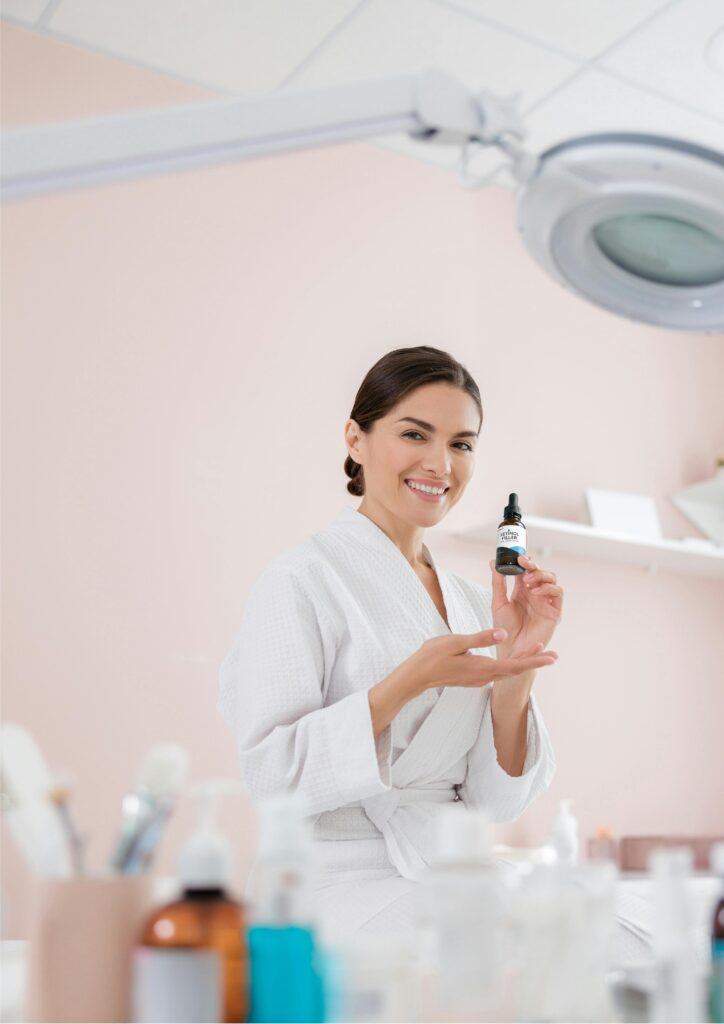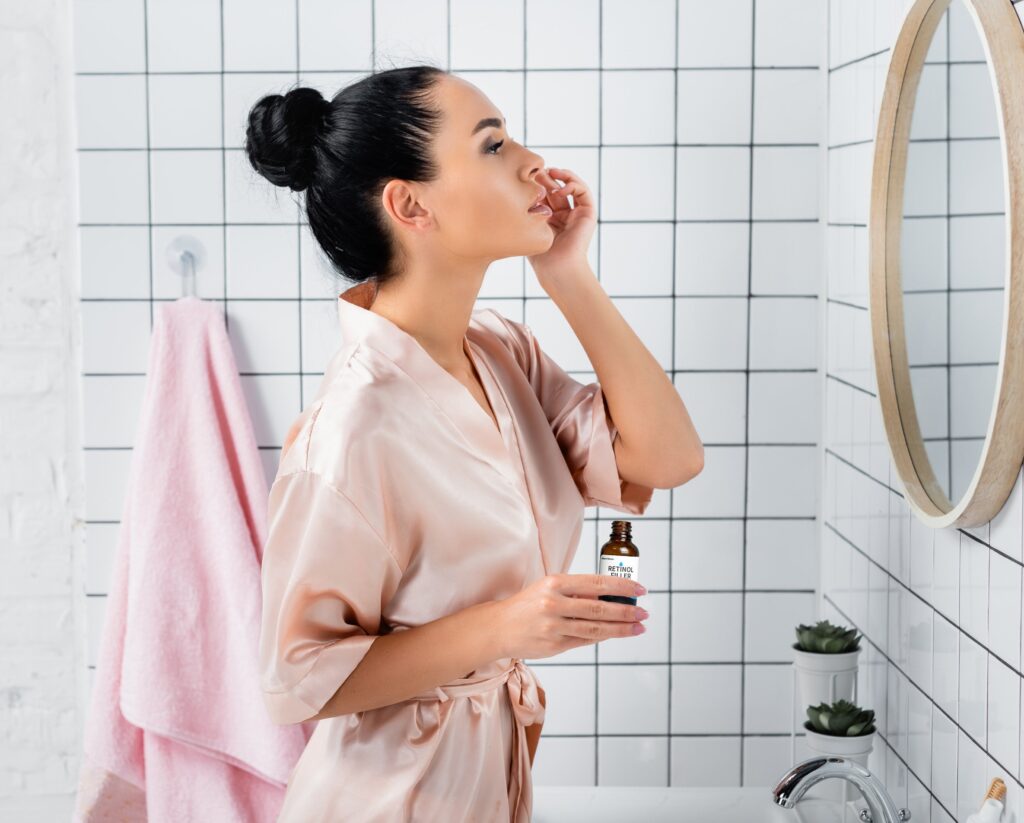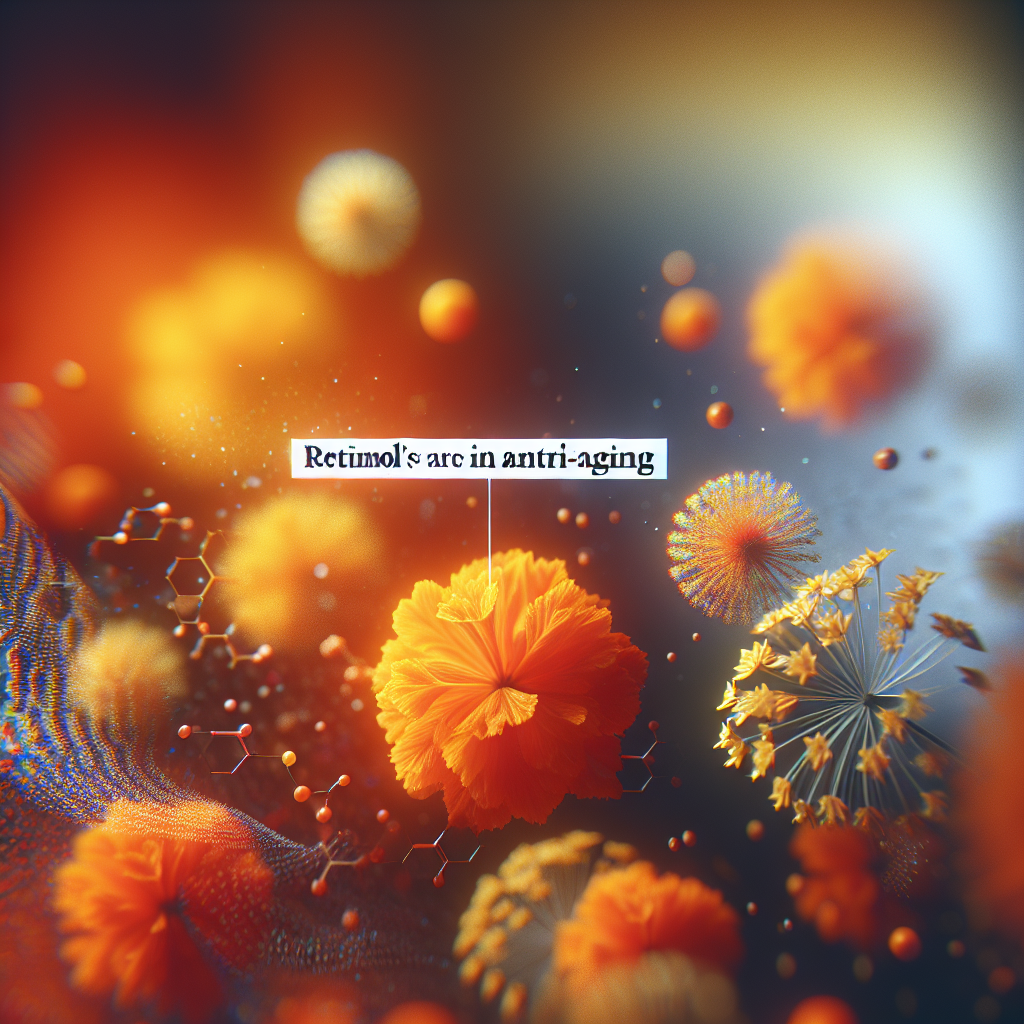Let’s talk about retinol and its vital role in anti-aging products. We all know that the quest for youthful skin can sometimes feel like an uphill battle, but fear not, because retinol is here to save the day. This powerhouse ingredient is like a knight in shining armor, fighting against the signs of aging, such as fine lines, wrinkles, and uneven skin tone. From stimulating collagen production to improving skin texture, retinol is the secret weapon that can turn back the clock on your skin, leaving you with a radiant and youthful complexion. So, buckle up and get ready to discover how retinol can be your skin’s new best friend!

Understanding Retinol
What is retinol?
Retinol is a derivative of vitamin A, which is a key ingredient in many anti-aging skincare products. It is a powerful antioxidant that has been shown to effectively promote skin cell turnover and stimulate collagen production. Retinol is known for its ability to diminish the appearance of wrinkles, fine lines, and other signs of aging, making it a highly sought-after ingredient in the field of skincare.
How does retinol work?
Retinol works by binding to specific receptors in the skin, which then triggers a cascade of reactions that result in increased cell turnover and collagen synthesis. This process helps to improve the overall texture and tone of the skin, while also reducing the appearance of wrinkles and fine lines. Additionally, retinol offers antioxidant benefits by neutralizing free radicals, which can damage the skin and contribute to aging.
Different forms of retinol
Retinol is available in various forms to suit different skincare needs. These forms include retinyl palmitate, retinyl acetate, and retinaldehyde. Each form has its own unique benefits and strengths, as well as varying levels of potency. It’s important to understand the differences between these forms and choose the one that best suits your specific skin concerns and tolerance.
Benefits of retinol in skincare
Retinol offers a multitude of benefits when incorporated into a skincare routine. Apart from its renowned anti-aging properties, retinol can help improve skin texture, reduce the appearance of acne scars, fade pigmentation and dark spots, and unclog pores. It can also enhance the effectiveness of other skincare ingredients, allowing them to penetrate deeper into the skin and deliver better results. With its versatile range of benefits, retinol is a valuable asset in achieving healthier, younger-looking skin.
Retinol and Anti-Aging
Effects of retinol on aging skin
Retinol works wonders on aging skin by addressing multiple concerns simultaneously. It helps to reduce the appearance of fine lines and wrinkles by boosting collagen production, which results in increased skin elasticity and firmness. Additionally, retinol can improve skin tone and texture, smooth rough patches, and even out pigmentation irregularities caused by sun damage or aging. By promoting skin cell turnover, retinol helps to unveil a fresher, more youthful complexion.
Stimulating collagen production
Collagen is a vital protein that provides structure and support to the skin, keeping it plump and resilient. As we age, collagen production naturally declines, leading to the formation of wrinkles and sagging skin. Retinol, however, is capable of stimulating collagen synthesis, effectively counteracting the effects of aging. By encouraging the production of new collagen fibers, retinol helps to restore the skin’s firmness and elasticity, resulting in a smoother, more youthful appearance.
Reducing the appearance of wrinkles and fine lines
One of the most notable benefits of retinol is its ability to diminish the appearance of wrinkles and fine lines. Retinol not only helps to boost collagen production but also works to increase cell turnover, allowing new and healthier skin cells to replace the old ones. This turnover process helps to smooth and refine the skin’s texture, reducing the visibility of wrinkles and fine lines. With consistent use, retinol can significantly improve the overall appearance of aging skin.
Choosing Retinol Products
Finding the right concentration
When choosing a retinol product, it’s important to consider the concentration of retinol it contains. Higher concentrations may deliver faster and more noticeable results, but they can also be more irritating, especially for those with sensitive skin. Start with a lower concentration and gradually work your way up to higher strengths as your skin becomes tolerant. It’s always wise to consult with a dermatologist or skincare professional to determine the most suitable concentration for your specific needs.
Considerations for sensitive skin
Retinol can be drying and irritating, particularly for those with sensitive or dry skin. To avoid potential skin reactions, it’s essential to choose retinol products specifically formulated for sensitive skin or with added moisturizing ingredients. Additionally, it’s crucial to patch test any new retinol product before applying it to your entire face, as this can help identify any adverse reactions or allergies.
Combining retinol with other ingredients
Retinol can be combined with other skincare ingredients to enhance its benefits. Ingredients such as hyaluronic acid and niacinamide can help hydrate and soothe the skin while minimizing potential irritation caused by retinol. It’s best to consult with a skincare professional or dermatologist to create a personalized skincare routine that incorporates retinol and other compatible ingredients for optimal results.
Using Retinol Products
Applying retinol correctly
To maximize the effectiveness of retinol, it’s important to apply it correctly. Start by cleansing your face thoroughly, including the neck and décolletage if desired. Retinol should be applied to clean, dry skin in the evening, as exposure to sunlight can reduce its efficacy. Use a pea-sized amount of retinol and gently massage it into the skin, avoiding the delicate eye area. Follow up with a moisturizer to lock in hydration and help minimize potential dryness or irritation caused by retinol.
Gradual introduction and adjustment period
If you’re new to retinol, it’s important to introduce it gradually into your skincare routine. Begin by using retinol products once or twice a week, gradually increasing the frequency as your skin adjusts. During the adjustment period, some mild redness, peeling, and dryness may occur, which is normal. However, if these side effects become severe or persistent, it’s advisable to consult with a dermatologist for guidance on adjusting your retinol usage.
Potential side effects and how to minimize them
Retinol can cause some side effects, especially during the initial stages of use. These may include redness, dryness, flaking, and even temporary sensitivity to sunlight. To minimize these side effects, it’s crucial to start with a lower concentration of retinol and gradually increase it over time. Additionally, using a moisturizer and sunscreen during the day can help to alleviate dryness and protect the skin from sun damage. If you experience severe or prolonged side effects, it’s recommended to seek professional advice.

Retinol in Day and Night Skincare Routine
Incorporating retinol in morning skincare
Retinol is generally recommended for use in the evening due to its potential for sun sensitivity. However, if you prefer to incorporate it into your morning skincare routine, it’s essential to pair it with a broad-spectrum sunscreen with a high SPF. Applying sunscreen after using retinol helps to protect the skin from harmful UV rays, minimizing the risk of sunburn and other sun-induced damage. Remember to reapply sunscreen every few hours for optimal protection throughout the day.
Using retinol in evening skincare
Evening is the ideal time to use retinol due to its sensitivity to sunlight. Applying retinol before bed allows it to work uninterrupted while you sleep, maximizing its anti-aging benefits. After cleansing your face thoroughly, apply retinol to clean, dry skin, gently massaging it in. Follow with a moisturizer to keep the skin hydrated and nourished throughout the night. Consistency is key to achieving the best results with retinol, so make it a regular part of your evening skincare routine.
Pairing retinol with sunscreen
Regardless of whether you use retinol in your morning or evening skincare routine, it is crucial to pair it with a sunscreen during the day. Retinol can make the skin more sensitive to the sun, increasing the risk of sunburn and sun damage. By using a broad-spectrum sunscreen with SPF 30 or higher, you can protect your skin from harmful UV rays and prevent any potential damage caused by the sun’s rays. Remember to apply sunscreen generously and reapply as needed throughout the day.
Retinol and Sun Sensitivity
Understanding retinol-induced photosensitivity
Retinol can make the skin more sensitive to sunlight, a condition known as retinol-induced photosensitivity. This means that when using retinol, the skin is more susceptible to sunburn and damage from UV radiation. It’s crucial to take precautions by using sunscreen and minimizing sun exposure while using retinol to prevent any potential harm to the skin.
Importance of sunscreen when using retinol
The use of sunscreen is of utmost importance when using retinol products. Sunscreen helps to shield the skin from harmful UV rays that can cause various forms of damage, including premature aging, sunburn, and even skin cancer. By applying a broad-spectrum sunscreen with a high SPF every day, you can protect your skin and mitigate the potential risks associated with retinol-induced photosensitivity.

Dermatologist’s Advice on Retinol
Consulting a dermatologist
Before incorporating retinol into your skincare routine, it’s always beneficial to consult with a dermatologist. A dermatologist can assess your skin’s specific needs and help determine whether retinol is suitable for you. They can also provide guidance on the appropriate concentration, frequency, and combination with other skincare products. A dermatologist’s expertise will ensure that you are using retinol in the most effective and safe manner for your skin.
Professional guidance in choosing retinol products
With the multitude of retinol products available on the market, choosing the right one can be overwhelming. Dermatologists can offer valuable advice on selecting retinol products that are appropriate for your skin type, concerns, and goals. They can recommend reputable brands and formulations that are most likely to deliver the desired results without causing unnecessary irritation or side effects. Seeking professional guidance can greatly optimize the benefits you derive from using retinol.
Addressing individual concerns and goals
Each individual has unique skin concerns and goals, and a dermatologist can address these specific needs when it comes to retinol usage. Whether your primary concern is reducing wrinkles, improving skin texture, or fading uneven pigmentation, a dermatologist can tailor a retinol regimen that targets your specific concerns. Furthermore, they can offer advice on other complementary skincare practices or treatments that can enhance retinol’s effectiveness, such as chemical peels or microneedling.
Retinol and Prescription vs. Over-the-Counter
Prescription retinol products
Prescription retinol products, also known as retinoids, are available through a dermatologist. These products contain higher concentrations of retinol than are typically found in over-the-counter products. Prescription retinol is often recommended for those with more severe skin concerns or who have shown tolerance to lower-strength retinol products. These products require a doctor’s prescription and should be used under their supervision to ensure safety and optimal results.
Over-the-counter retinol products
Over-the-counter retinol products are readily available in beauty and skincare stores, pharmacies, and online retailers. These products contain lower concentrations of retinol but can still provide significant benefits when used consistently. Over-the-counter retinol products are a good starting point for those new to retinol or with milder skin concerns. It’s important to choose reputable brands and consult with a skincare professional to ensure you are selecting the most appropriate over-the-counter retinol product for your needs.
Key differences and considerations
The key differences between prescription retinol and over-the-counter retinol lie in their concentrations and availability. Prescription retinol products tend to have higher strengths and are only available through a dermatologist. They are suitable for those with more advanced skin concerns and who have built tolerance to lower-strength retinol products. On the other hand, over-the-counter retinol products are more accessible and offer a range of concentrations suitable for different skin types and concerns. It’s important to weigh the pros and cons of each option and seek professional advice to determine the most suitable choice for you.

Retinol Alternatives
Other ingredients with anti-aging properties
While retinol is a powerful anti-aging ingredient, there are several alternatives available for those who may not tolerate or prefer not to use retinol. Some effective alternatives include peptides, antioxidants like vitamin C and E, hyaluronic acid, and various plant-based extracts such as green tea or aloe vera. These ingredients can provide similar benefits in terms of reducing the appearance of wrinkles, improving skin texture, and enhancing overall skin health.
Effectiveness of alternative ingredients
While alternative ingredients may not have the extensive research and proven track record of retinol, many have shown promising results in combating the signs of aging. Peptides, for example, can help improve skin firmness and elasticity, while antioxidants protect against free radicals and reduce inflammation. Hyaluronic acid is known for its excellent hydration properties, and plant-based extracts have a range of benefits such as soothing, brightening, or providing gentle exfoliation. Assessing individual needs and preferences can help determine the most effective alternative for each person.
Combining retinol with other anti-aging products
For those who wish to maximize the benefits of their anti-aging skincare routine, combining retinol with other compatible ingredients can be a worthwhile approach. As mentioned earlier, hyaluronic acid, peptides, and antioxidants can complement retinol’s effects and provide additional nourishment and hydration to the skin. However, it’s important to layer products correctly to ensure optimal absorption and efficacy. Consulting with a skincare professional can help create a personalized skincare regimen that incorporates retinol and other target-specific ingredients to achieve desired results.
Conclusion
Retinol as a powerful weapon against aging
Retinol has earned its reputation as a powerful weapon against the signs of aging. Its ability to stimulate collagen production, increase cell turnover, and reduce the appearance of wrinkles and fine lines make it a highly sought-after ingredient in anti-aging skincare products. The consistent use of retinol can lead to a more youthful complexion, improved skin texture, and a boost in overall skin health.
Choosing the right retinol product for your needs
When choosing a retinol product, it’s important to consider factors such as concentration, suitability for sensitive skin, and compatibility with other skincare ingredients. Consulting with a dermatologist can provide valuable guidance in selecting the most appropriate retinol product for your specific concerns and goals. This ensures that you are using retinol safely and effectively, maximizing its benefits.
Consistency and patience in achieving desired results
Retinol is not a quick-fix solution for aging skin. Achieving desired results requires consistency and patience. It may take several weeks or even months of regular use before noticeable improvements are seen. It’s important to stick to a skincare routine that incorporates retinol, follow the recommended usage guidelines, and allow time for the skin to adjust. With perseverance and the guidance of a skincare professional, retinol can help you achieve healthier, more youthful-looking skin in the long run.





